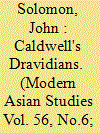|
|
|
Sort Order |
|
|
|
Items / Page
|
|
|
|
|
|
|
| Srl | Item |
| 1 |
ID:
187737


|
|
|
|
|
| Summary/Abstract |
This article examines British Protestant missionary scholars' representations of Tamil culture and history, analysing how this form of knowledge evolved in relation to missionary concerns and the intellectual trends of nineteenth-century India. I focus on the work of Robert Caldwell, whose scholarship had a profound influence on the identity discourses of twentieth-century Tamil nationalism. I situate Caldwell's work in ethnography and philology within the broader field of colonial knowledge produced about Tamils in nineteenth-century India and within a broader study of British missionary concerns in South India. I examine two of Caldwell's publications to argue that his later work, far from being driven by mere scholarly interests, was also shaped by his concerns as a missionary, and that his evolving scholarship mirrored the development of anti-Brahmanism in British Protestant missionary circles of the time. Missionary anti-Brahmanism arose as a response to the caste system, which missionary groups came to regard as the biggest obstacle to Christian conversions. Departing from some of his earlier ideas, Caldwell strategically positioned his later work to challenge Brahman influence, which he saw as being intrinsically tied to the strength of caste sentiment in Indian society. Caldwell's construction of a discursive framework for understanding Tamil linguistic identity was informed by public reactions to his first publication and his subsequent understanding of the dynamic relationship between European scholarship and Indian social relations. More broadly, this article demonstrates the close relationships between Protestant Christian missionary activity, Indian social politics, and the field of knowledge production in colonial South India.
|
|
|
|
|
|
|
|
|
|
|
|
|
|
|
|
| 2 |
ID:
126142


|
|
|
|
|
| Publication |
2013.
|
| Summary/Abstract |
The late-nineteenth century in India, usually scrutinized for the emergence of anti-colonial nationalist thought and politics, witnessed broader, and potentially more radical changes in the making and re-making of political subjectivities as articulated within burgeoning vernacular public spheres. Vernacular publics coalesced around the emergence of new communicative forms, the formation of voluntary and political associations, and the restructuring of literary communities. It is within this context I place the writings of Gidugu Venkata Ramamurti (1863-1940). He proclaimed at the turn of the twentieth century that Telugu as a language had to be reformed in order for it to become an appropriate medium for the newly emergent Telugu public spheres. Through his study of linguistics, his commitment to educational reform, and his study of Telugu language and literature, Ramamurti became the spokesperson for a new Telugu that would be able to traverse the boundaries of modern genres of writing that flourished in the colonial era. Fully immersed in linguistic theories of the day, Ramamurti's concerns were primarily with language reform and its centrality in the remaking of political subjectivities.
'In this era there is an important challenge facing us. There is no Telugu word for 'challenge,' nevertheless, the word, 'dhikaaramu' or defiance, comes close. For that reason, I am calling this era, 'dhikaara yugamu,' the age of defiance. In the past, society was divided between free people and the enslaved. Soon, the enslaved defied the power of the free and freed themselves. In the past, women were not allowed to be educated nor were they allowed to work. Now they are asking themselves why they were not considered more productive in society? These days, women are performing all kinds of work. . . .Until recently, in most countries the wealthy held power. And now the poor are challenging the power of the rich'.
|
|
|
|
|
|
|
|
|
|
|
|
|
|
|
|
|
|
|
|
|